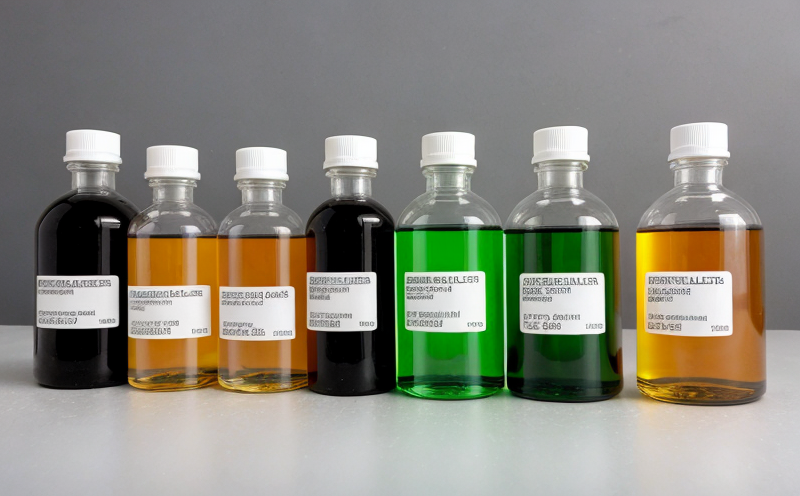Simulation Study of Use Condition Leachables
In the realm of medical device testing, one critical aspect that cannot be overlooked is chemical characterization and extractables/leachables. This service focuses on understanding the potential compounds released from a medical device under use conditions, thereby ensuring patient safety and compliance with regulatory standards.
The simulation study of use condition leachables involves a meticulous examination of various factors that can influence the release of chemicals from the material components of a medical device. These factors include but are not limited to temperature, humidity, contact time, and exposure to biological fluids such as blood or saline solutions. By replicating real-world conditions in laboratory settings, we aim to predict potential risks associated with the use of these devices.
The first step in this process is thorough material characterization using advanced analytical techniques like Fourier Transform Infrared Spectroscopy (FTIR), Gas Chromatography-Mass Spectrometry (GC-MS), and Liquid Chromatography-Mass Spectrometry (LC-MS). These methods help identify the chemical composition of the device materials, enabling us to understand which compounds might be susceptible to leaching.
Once identified, these potential leachable compounds undergo a series of simulations designed to mimic actual use conditions. This includes immersing the devices in simulated body fluids under controlled temperature and humidity levels. The immersion time is carefully calibrated based on expected usage patterns for each device type. After exposure, extracts are analyzed again using similar analytical techniques to determine any changes or increases in leachable concentrations.
The results of these studies provide valuable insights into how a medical device might interact with its intended environment during use. This information is crucial not only for ensuring patient safety but also for meeting regulatory requirements set forth by organizations such as the U.S. Food and Drug Administration (FDA), European Medicines Agency (EMA), and International Organization for Standardization (ISO).
By conducting rigorous simulation studies, we contribute to the development of safer medical devices that can be trusted in critical healthcare settings worldwide.
- Increased Regulatory Compliance: Ensuring adherence to global standards through detailed simulation testing.
- Patient Safety: Minimizing risks associated with unintended chemical release during use.
- Product Development: Providing data that informs design modifications and material selections.
- Supply Chain Management: Supporting suppliers in maintaining consistent quality across batches.
International Acceptance and Recognition
The simulation study of use condition leachables has gained widespread acceptance within the international medical device community. Regulatory bodies like the FDA, EMA, and ISO have established guidelines that mandate such testing for certain types of devices. Compliance with these standards not only ensures product safety but also facilitates smoother market entry into various regions.
ISO 10993-12 specifically addresses biocompatibility evaluation through extractables/leachables studies. It outlines procedures for identifying and quantifying substances that may enter the body during normal use of a device. Adherence to these standards demonstrates commitment to quality and safety, which is increasingly becoming a requirement rather than just an option.
EMA guidelines emphasize the importance of understanding how materials interact with biological systems over time. By incorporating simulation studies into their product development processes, manufacturers can address potential risks early in the design phase, leading to more robust products that meet stringent regulatory expectations.
The FDA's Center for Devices and Radiological Health (CDRH) also places significant emphasis on this type of testing, particularly for implantable devices. Their recommendations highlight the need for thorough evaluation of all materials used in device manufacture to ensure they do not pose hazards when exposed to biological environments.
International recognition extends beyond mere compliance; it fosters a culture of continuous improvement within the industry. As more companies adopt these practices, we see an overall enhancement in product quality and safety across borders. This collaborative approach helps build trust among healthcare providers and patients, further solidifying the importance of rigorous testing protocols like those employed for simulation studies.
Environmental and Sustainability Contributions
The pursuit of sustainability has become a global priority, and medical device manufacturers play an integral role in this endeavor. By conducting thorough simulation studies on use condition leachables, we contribute significantly to environmental protection efforts while promoting sustainable practices.
Understanding the chemical components released into the environment during waste disposal is crucial for minimizing ecological impacts. Our simulation studies provide valuable data that inform best practices for proper disposal and recycling of medical devices. This knowledge helps reduce landfill burdens and encourages responsible handling techniques, ultimately contributing to a healthier planet.
In addition to environmental benefits, these studies also support sustainable business operations by reducing waste and optimizing resource usage throughout the supply chain. By identifying non-leachable materials early in the design process, manufacturers can minimize material costs while enhancing product performance. This dual benefit of cost savings and improved sustainability aligns perfectly with modern corporate social responsibility (CSR) initiatives.
Moreover, sustainable development goals are increasingly becoming a key consideration for investors when evaluating potential partners or projects. Companies that demonstrate leadership in environmental stewardship through rigorous testing practices like ours stand to gain significant competitive advantages in the market. As consumers become more environmentally conscious, brands that prioritize sustainability will likely attract greater loyalty and support.
Overall, the simulation study of use condition leachables plays a vital role in fostering sustainable development within the medical device industry. It not only promotes safer products but also contributes to broader societal goals related to environmental protection and responsible business practices.





